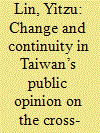| Srl | Item |
| 1 |
ID:
157190


|
|
|
|
|
| Summary/Abstract |
The Sunflower Student Movement was a significant event in Taiwan’s political history. Contrary to the conventional wisdom, we argue that the effect of the movement on the attitude of the general public, particularly the young, toward the cross-Strait economic interactions and the perception that Taiwan may be forced to make political concessions resulting from such ties is limited. Based on the Taiwan National Security surveys, we find out that the movement, to a certain extent, reflected public sentiment already existing in the society, and did not push the sentiment further. Compared to the attitude toward national identity, which is more long-lasting, the views on the cross-Strait economic ties may be more volatile, and are thus less predictable.
|
|
|
|
|
|
|
|
|
|
|
|
|
|
|
|
| 2 |
ID:
181844


|
|
|
|
|
| Summary/Abstract |
This article builds on the theoretical debate over age, period, and cohort effects (APC) and explores how these factors might affect Taiwan's partisan stability. We conducted a two-level multinomial logit random effects model using survey data from 1991 to 2020 to disentangle the APC effects. Our findings challenge Converse's core assumption that partisanship strengthens with age. As a new democracy, Taiwan's party affiliations remain fluid, and we do find evidence of period effects, particularly associated with cross-Strait crises that favor the DPP. However, generational replacement is the most significant factor driving party identity changes in Taiwan. With generational replacement, the Kuomintang is burdened by the image of a century-old party. The Democratic Progressive Party (DPP) had previously fared better among young cohorts but has recently lost its support from millennials. The youngest generation increasingly refuses to associate with the traditional political parties. It seems reasonable to expect that the new generational forces will restructure the Blue–Green cleavage and expand the ideological diversity of Taiwan's party system.
|
|
|
|
|
|
|
|
|
|
|
|
|
|
|
|